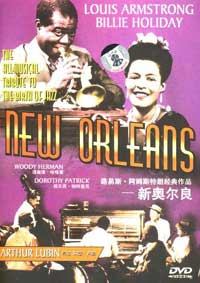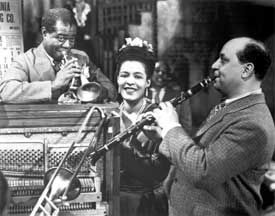 New Orleans (1947) asserts itself as a history of jazz as originating in New Orleans. Now as history this thing is pretty much fake from beginning to end, but on some impressionistic level it's true, because the implication that modern jazz owes just about everything specifically to Louis Armstrong just ain't that far off the mark.
New Orleans (1947) asserts itself as a history of jazz as originating in New Orleans. Now as history this thing is pretty much fake from beginning to end, but on some impressionistic level it's true, because the implication that modern jazz owes just about everything specifically to Louis Armstrong just ain't that far off the mark.
The film is also great for showing friendships between whites & blacks that seem very real & natural. This was not nearly common enough in films of the 1930s & 1940s, when hard as it is to believe, motion picture codes formally in the name of "morality" restricted content in films that dared imply an integrated society was a good thing.
Now & then in the movies there'd be a pairing like Jack Benny & Eddie "Rochester" Anderson in which Rochester definitately transcends being a Man Friday. And the character of Rochester even evolved, by the television era, into an equal & peer, with the Benny & Anderson households visiting one another with no intimation of a boss/servant relationship remaining. Or Mantan Morland & Frankie Darro made detective-comedies together in which they were equals in pal-hood & apparently had been since childhood.
But in general black & white did not mix in old movies, & in particular, black men were almost never permitted social interaction with white women in films, & white interaction was in general acceptable only with a porter or a maid.
In New Orleans stereotypes certainly are not obliterated, but friendships & bonds occur across gender & color barriers, due to a mutual love of ragtime. Which, by the by, was why many whites feared jazz as "inciting" just these kinds of bonds.
So while the story wants to be a romance of a white guy who became a leading jazz promoter & agent as the new musical form was getting established, the film nevertheless has no desire to disguise the origins of America's greatest musical artform as originating in the African American community.
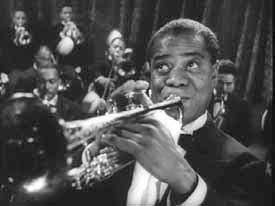 Considering how this film was made when Civil Rights were hard to claim & Jim Crow was in full force & the Motion Picture Code explicitly censored any intimation of black & white affection as leading to what was popularly despised as "miscegenation," well, give New Orleans some extra brownie points for at least striving. Considering how this film was made when Civil Rights were hard to claim & Jim Crow was in full force & the Motion Picture Code explicitly censored any intimation of black & white affection as leading to what was popularly despised as "miscegenation," well, give New Orleans some extra brownie points for at least striving.
Obviously it should've been much better, & it very nearly was. The film started out with Orson Welles, who interviewed Duke Ellington & others while researching his idea for a history of jazz from the 1890s to 1940, in an epic that might've been a match for Citizen Kane had Orson not flamed out early in his career.
His epic of New Orleans jazz igniting the cities of America was intended to be a much truer history & thus in the main about black musicians. Amidst the tatters of what he intended, as given to us by Arthur Lubin, we may yet catch glimpses of a greater, hidden truth.
The tale opens in 1917 with some remarkable film noir cinematography. Louis Armstrong & his band are preforming in a Basin Street cabaret & casino, a ragtime number "Name Your Poison Blues," a classic performance.
The casino is run by Nick Duquesne (Arturo de Cordova), alleged by all "decent" citizens to be a seedy character because of his associations with gambling & for hiring black musicians for his club.
The heroine Miralee Smith (Dorothy Patrick) is romantically drawn to Nick, known as "the king of Basin Street," for he's a cool guy. She's a trained singer in a boring Victorian style, but feels an enthusiasm for ragtime, which gets her in distinct trouble with her own family.
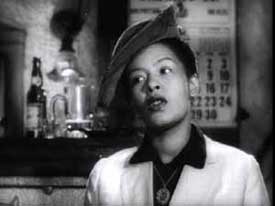 n Miralee's own home, their black maid Endie (Billie Holliday) gets yelled at for daring to play the piano a bit & singing jazz to herself during a break from housecleaning. But Merilee doesn't share her parents' disdain, & wants to be Endie's ragtime buddy. n Miralee's own home, their black maid Endie (Billie Holliday) gets yelled at for daring to play the piano a bit & singing jazz to herself during a break from housecleaning. But Merilee doesn't share her parents' disdain, & wants to be Endie's ragtime buddy.
Endie is Louis Armstrong's girlfriend, so is a great guide for exploring the nacent jazz world of New Orleans. Endie takes the wealthy white girl to the club where Endie sings an awesome bluesy ode to New Orleans, "Do You Know What It Means to Miss New Orleans."
Sounds damned cool, eh? Louis & Billie certainly sparkle, & we'll see their careers move from New Orleans to Chicago & New York & Paris, so that before all is said & done, Billie will additionally sing "Endie," "The Blues are Brewin'" & "Fairwell to Storyville," this latter having some vocal assistance from an uncredited Ethel Waters.
Louis will perform "Buddy Bolden Blues" & "Where the Blues was Born in New Olreans" with much else. Meade Lux Lewis will jam his way through "Honky Tonk Train Blues." If everything else about this movie stunk, it would be a must-see for Louis, Billie, & Lux.
So yeah, this could've been a truly great movie if it had focused even more on Billie & Louie, for fact is, the white love story we get between musical moments is a mite dull & dopy, because the white players haven't the same degree either of talent or charisma.
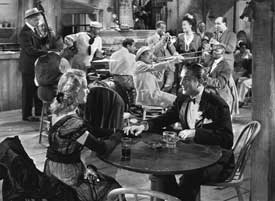 Miralee has slated a musical debut, & everyone expects her to show off her stuff in the most old fashioned & awful manner that appealed to high society. But her carousing Basin Street has caused her to think more daringly about her own musical opportunities. Miralee has slated a musical debut, & everyone expects her to show off her stuff in the most old fashioned & awful manner that appealed to high society. But her carousing Basin Street has caused her to think more daringly about her own musical opportunities.
And it so happens that the city's most eminant white conductor, Henry Ferber (Richard Hageman), is someone who secretly understands that the best musician anywhere in New Orleans is Louis Armstrong. He & Satchmo have semi-secret meetings at Nick's club & Ferber is learning ragtime (there's a "Satchmo & Ferber Jam" that's pretty nice).
Miralee is willing to take the risk & Mr. Ferber is kind of tired of being in the closet about his love of jazz, so on her big debut she sings the expected material but then she closes with a jazz piece. The white community is so scandalized that both Ferber & the young Miss Smith have to get out of town.
Meanwhile the white citizens have decided to route Basin Street & put the clubs out of business. This scatters New Orleans' musicians to the four winds, thus seeding jazz throughout the country, but especially in Chicago & New York.
Nick was run out of town along with the musicians & sets up anew in Chicago, first planning to continue to make his living running a gambling joint with music on the side. But there are so many displaced musicians & the new sound so appeals to a hip urban crowd that Nick becomes an entertainment agent. And he so believes in jazz that he has sworn to see it performed in Carnegie Hall, not just in speak-easies & bordellos.
Satchmo's rise to recognition is woven in here, & his band includes some great people, trombonist Kid Ory, clarinetist Barney Bigard, banjoist Bud Scott sounding a bit Jango on guitar, Zutty Singleton on drums, Red Callender on slap base, Papa Mutt Carey with trumpet, Lucky Thompson with sax, besides the great pianist Meade "Lux" Lewis.
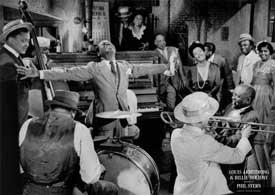 Time passes through the 1920s & if the style of music isn't authentic for each decade, it hardly matters, it's the right musicians at least, the people who really were there from the start. Time passes through the 1920s & if the style of music isn't authentic for each decade, it hardly matters, it's the right musicians at least, the people who really were there from the start.
On the surface an offensive plot turn occurs in that Nick's dream of Carnegie Hall becomes possible only when white musicians coopt this music. Apparently it wasn't part of his dream to insure recognition for the original musicians, but only for their music, even if it first had to be whitified.
But sad to say, there's more than a bit of truth to that as well. Dorothy Patrick though run out of New Orleans for daring to sing "race" music is a big hit in Europe (as are Louis & Endie at least). When she returns to the States she's the one that gets the Carnegie Hall gig, backed by Woody Herman & His Orchestra.
She does a version of "Do You Know What It Means to Miss New Orleans" which had been heavenly from Billie Holliday, but is just awful from Dorothy Patrick, though it could've been worse I suppose since she's actually being dubbed by Theodora Lynch, a trained singer but not a swing singer.
The subliminal message here is that those primitive black folks created a primitive form of jazz which was only worthy of Carnegie Hall after it became big band swing with white people playing it. The film is overall so much better than this unintended message it makes me wonder if the ending arose from pressures beyond the control of the creative team.
Louis Armstrong did of course make it to Carnagie Hall, but not before this film was made.
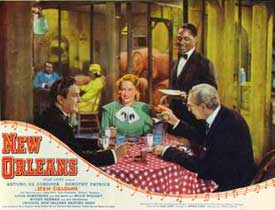 Nick the scoundrel who had been experiencing troubles with gangsters, & Marilee the society dame banished from New Orleans for daring to love jazz, had been separated since the start of the New Orleans diaspora. Nick evaded reunion until he could claim a higher position for the music he loved.
Nick the scoundrel who had been experiencing troubles with gangsters, & Marilee the society dame banished from New Orleans for daring to love jazz, had been separated since the start of the New Orleans diaspora. Nick evaded reunion until he could claim a higher position for the music he loved.
Thus it was through the Woody Hermann performance that the lovers were reunited for the film's happy ending. A happy ending I couldn't've cared less about.
The idea that a singer as bad as Marilee was required to make white folks listen to jazz is pretty lame, & who cares if she gets together with Nick. But in a way it's kind of effective that the rise of Louis Armstrong, even placed in the back of the story, becomes the overriding theme of the film because the forward love story is so boring. A little of Louis is bigger than a lot of Nick & Marilee.
It's too damned bad it couldn't've ended about Louis & Billie as cross-over performers rather than letting Woody Herman elbow his way into a weak finale.
Early in the story Marilee had claimed that jazz "is already mine," & in light of the story's climax, her audacity in assuming she was the true owner of that which was birthed & cultivated in Black America, is simply racist.
It is doubtful the filmmakers made Marilee bland on purpose, but it's ironic that the star claiming to own the music as her own was reduced to lipsyncing while the real musicians played & sang what really was their music.
Had Marilee actually been any good at it, there might've seemed to be some truth to her thieving claim that the music "is already mine," & that would've been a bad thing. I mean, had the white bandleader been Artie Shaw instead of Woody Herman, & the singer been, oh, Judy Garland, instead of some second-rate actress who couldn't even sing the damned stuff, someone might actually have approved of the misappropriation.
copyright © by Paghat the Ratgirl
|
